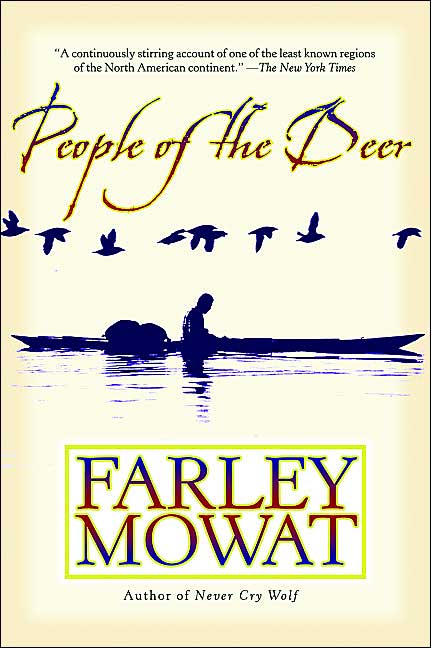-From People of the Deer by Farley Mowat

One of the first things we heard after moving to Bethel was that the Native Alaskans won't discipline their children because they wanted to be treated well when their children were taking care of them in old age. It made sense at the time, as we had quickly noticed that many Native kids seemed to behave as though there were no rules or consequences. At first, seeing this was troubling and we were offered this rote "excuse" by many non-native friends. In fact, I even repeated it to more than one person as a simple way to dismiss the differences in parenting styles, although deep down I didn't believe this to be anything more than a lame excuse.
So, when I came across this passage in Mowat's book, I was startled by how directly it spoke to me and I proceeded to dog-ear and reread it literally dozens of times. I also repeated this to anyone that would listen and even to people that didn't want to.
How is it that Mowat so succinctly named this 60+ years ago when we still say this same thing today?
Just prior to the earlier quote, Mowat says, "In the camps of the People the child is king, for childhood is short and tragedy often comes after. [. . .] so the early years of a child are made free of compulsion and of hard labors, for these years must always remain in the child's memory to alleviate the agonies which come with mature years."
I think this issue definitely crosses cultural bounds, with both non-native and native families being wrought by this. My concern is that as we have matured as a society and relieved some of the "agonies" that maturity traditionally brought, we have also allowed our children a longer childhood to be without consequence. Granted, today's children are subject to a hyperspeed version of youth that few of us can comprehend, however, one would think that the result would be a hyper-maturing of our youth instead of the other way around.
Mowat tells of his first encounter with Franz and his "family" of adopted Eskimo children, where the four-year-old daughter readied tea for the men and was quickly embracing the roles of the woman. Not many four-year-olds I've known could be entrusted with such a task!
Yet, here we are in the 21st Century and we let our children be unaccountable well into their teen and young adult years. And, instead of teaching our kids how to be adults, we let them off the hook and say we don't want them to be cruel to us when we are old and no longer useful. This seems to counter the original purpose of giving children an easier early life. Instead, now we foster laziness and rude behavior as though it is some God-given right of childhood.
In today's world, where cultures have merged and technology has connected us in a way few could have ever imagined, we actually have accomplished the opposite of the original "native" rules for children. We have, in fact, just given our children a free pass, not to have some fond memory of the greatness of youth or to give them some wonderful memory of easier times, but rather to learn how to take the easy way out of most things.
Unfortunately, the ultimate cost to humanity of raising our children in this manner will not be fully known until these youth are adults with no work ethic, no cultural heritage, no knowledge of anything but how to take advantage of the system.
1 comment:
I have some thoughts on this topic...I'd be happy to share. Track me down if you're interested.
Post a Comment